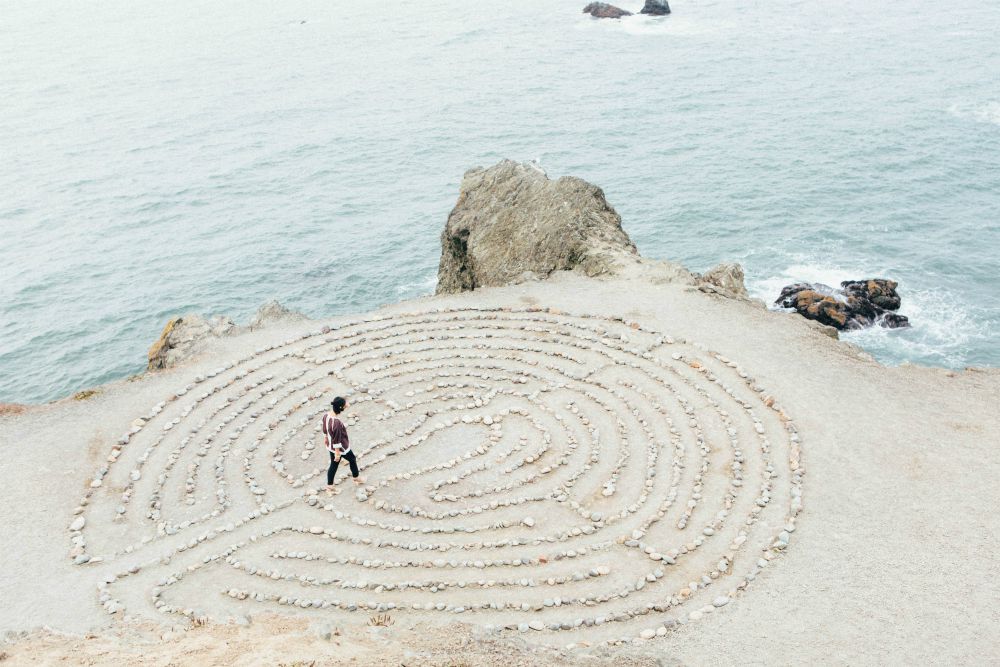
(Unsplash/Ashley Batz)
There was such a positive response to my Aug. 15 "manifesto" on how prayer helps me survive dark times that people I respect suggested I write a follow up.
So much has been printed about the mysterious power and solace of prayer that it is hard to know where to begin. Perhaps telling a few stories about myself is a place to start.
When I was 12, a rain storm threatened to cancel a Girl Scout camping trip that I had been anticipating for weeks. My pouting and complaining were wearing my mother down, so she finally told me to go and pray to St. Jude. I went into my parents' bedroom, knelt before the St. Jude statue that always graced their bureau and prayed for the rain to stop.
And it did! My longed-for camping trip was back on. Early lesson here — prayer actually works!
That is one reason why through college and as a young adult I continued to experiment with many kinds of prayer — the Mass, the rosary, the Psalms, reflections on Scripture, centering prayer, journaling, frequent small prayers throughout the day, etc.
They were all good, but eventually I found myself feeling confused and at a loss. I wasn't sure I was actually praying "right," and I needed some advice. So I made an appointment to see Congregation of St. Joseph Sr. Hope Greener, who had impressed me with a talk she gave at my local parish. Hope listened quietly as I outlined (in probably excruciating detail) my prayer routine — Psalms, Scripture, reflection, journal etc. When I finally finished, Hope looked kindly at me and said simply, "Prayer, Chris — prayer is a relationship."
A relationship? Not a ritual to please a somewhat strict Father-God (as I usually imaged God at the time)?
Hmm.
From then on, whenever I entered into my time of quiet, I first imaged God as someone very like a dear college friend who had loved me unconditionally through difficult times. A loving relationship. Yes, that's what had been missing. My heart began to open up in unexpected ways. And great stuff began to happen — healing stuff and love stuff and surprising creativity-in-new-directions stuff. (Not to mention strength in times of trial and determination to work on behalf of marginalized women and refugees.)
Advertisement
The God of loving relationship changes things — me first of all. (Oh, yes — and I was led into nundom, CSJ-style, but that is another story.)
So when I am in a purple funk over all the evil in the world (or in myself), I remember and rely on my relationship with the God who loves me unconditionally. And I recall Paul's letter to the Romans where he writes: "Where sin increased, there grace abounded all the more."
Because, you see, the divine love-energy at work in the world is bigger than all the evil, all the sin, all the destruction. But this is also a great mystery. We cannot be naïve about the nature of evil that is far bigger than we can understand, but that we are nevertheless called to resist with all of our strength, no matter how hopeless things appear.
We are not alone in struggling to make our world a better place. There is one who went before us — the Jesus of history and of our faith — who also struggled mightily against worldly powers and principalities and died on behalf of the goodness of the God to whom he witnessed.
I was once asked by a dear nun-mentor what I made of the Jesus we find in the Gospels. I told her I knew of only one power on Earth that would make Jesus do what he did, and that is the power of love. So, I said, Jesus must have loved God an awfully lot to do what he did.
Jesus' deep and loving relationship with God is what gave him strength to resist the injustices of his times. (These injustices, by the way, were ones in which his own religious and political leaders were complicit, much as today — and indeed, throughout history.)
Jesus' resistance of evil led to his death. In our own times, resistance to racism, homophobia, and exploitation of the poor and of the environment led to the deaths of other faithful people of conscience: Rev. Dr. Martin Luther King, Harvey Milk, Archbishop Óscar Romero, the four Salvadoran churchwomen and Sr. Dorothy Stang, to name just a few. And just like Jesus', their lives and their deaths energized thousands of others to work for a more just and loving society.
Evil powers and worldly principalities thought they had defeated Jesus, but they were fooled. The God of relationship raised him up as first witness, brother and healing friend to those like us who are also called to resist the evils such as racism, homophobia, sexism, environmental exploitation and human trafficking to our dying breath.
With the help of the God who loves-us-beyond-all-telling, we, too, will be given strength and courage to follow Jesus in whatever way the Spirit leads.
[St. Joseph Sr. Christine Schenk served urban families for 18 years as a nurse midwife before co-founding FutureChurch, where she served for 23 years. She holds master's degrees in nursing and theology.]
Editor's note: We can send you an email alert every time Christine Schenk's column, Simply Spirit, is posted. Go to this page and follow directions: Email alert sign-up.








